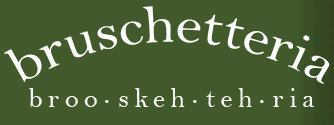“ARE YOU TRYING TO SAY CAPISCE (PRONOUNCED CAP-E-SHAY)? WELL DON’T DO IT, BECAUSE IT HURTS MY EARS WHEN YOU DO IT”
Vinnie Antonelli, My Blue Heaven, 1990
Played by Steve Martin
I wish I had a dollar for every time a friend, relative, server and even experienced Italian restauranteurs offered me slices of crusty Italian bread topped with an aromatic blend of tomatoes, basil and olive oil – and called it “Bru – shetta”. Stop! You’re hurting my ears. Why is this word continuously mangled, even by Italians? The proper spelling is bruschetta and it is pronounced “broo-skeh-tah, emphasis on the “k” in the second syllable. And of course, it comes in many forms, not just tomato, basil and olive oil. Every time I encounter a server mispronouncing this delightful tidbit, I’m compelled to let them know that they will sound really smart and will impress their customers and management alike, if they correctly give this word the love and respect it deserves. They always smile, are appreciative of the advice and proudly go on to display their new found knowledge. What I find amazing is the lack of training of the waitstaff on proper pronunciation in an Italian restaurant. Why can’t they pronounce their own food?
And that’s not the only word which is habitually misspelled or mispronounced. A recent article by Mary Ann Castronovo Fusco, reproduced in “Italian America” magazine, a publication of the Order Sons of Italy in America, also listed the following common mistakes:
Pinot Grigio is pee-noh gree-joh, not gree-jee-oh.
Linguine not linguini – even Merriam-Webster gets this one wrong by saying they are interchangeable. There is no such ward as linguini in Italian.
Espresso, not Expresso.
Prosciutto is proh-shoot-oh, not pruh-zhoot.
Limoncello is lee-mohn-chehl-oh, not lemon-cello.
Radicchio is rad-dee-kyoh, not ruh-dick-ee-o.
And capocollo is not gabagol. Now, of course, most of us use words like “gabagol” because this was the pronunciation assigned by our immigrant grandparents or parents. And words are pronounced differently depending on dialect or eventual Americanization. I point out the correct pronunciations only out of utmost respect to a language with the most popular culinary heritage in the world.
Ms. Fusco gives numerous additional examples of the rampant misspellings and mispronunciations, but I think you get her point and mine as well.
Last, but not least, she quotes Dante, the great Florentine poet of the Middle Ages, in Canto Three of his “Inferno”, where he writes, “…at first these sounds resounding made me weep; tongues confused, a language strained in anguish…And I in the midst of this circling horror, began, “Teacher, what are these sounds I hear?”.…. Ms. Fusco so aptly notes, “Who knew Dante had been to an Italian restaurant in America?”
N.B. Dried pasta should be cooked al dente pronounced dehn-teh, not al dante – Dante was a poet!
Note on the Author: Mary Ann Castronovo Fusco has a Masters Degree in Italian from Rutgers University. Her article originally appeared in the February 2011 issue of New Jersey Monthly. Her website is macfusco.com. I know you will enjoy her.
